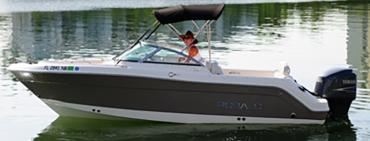
Nobody argues against slowing boats to a crawl in waters where slow-moving, endangered manatees swim and raise their young. Nor should they. There are only an estimated 5,000 of these big aquatic mammals, relative of the elephant, left in Florida waters.
But manatees aren't found in all state waters. And they definitely aren't found with anything but rare exception in two Pinellas County basins where Florida regulators are slapping what Pacific Legal Foundation (PLF) calls "unjustified restrictions" on water recreation.
PLF is now deeply involved in a legal fight on behalf of Bill Thomas, an Indian Rocks Beach man who just wants to use his boat as the law allows. But the Florida Fish and Wildlife Conservation Commission (FWC) is denying him that right, "bowing to politics instead of science," PLF says.
Earlier this month, PLF filed an administrative challenge to FWC’s proposal to impose boat speed limits in the basins where the commission’s own staff recognized there is no scientific or legal justification for regulations and recommended against them — specifically, two man-made water areas around Indian Rocks Beach popular with boaters, water skiers, and jet skiers. There is simply an infrequency of manatee sightings. (See the filed petition here.)
Thomas' home is one of several at Indian Rocks Beach that is adjacent to the basins. Donor-supported PLF represents Thomas free of charge, as it does with all its clients.
Retiree and boatng enthusiast Thomas described his plight in an Aug. 24 opinion column, "It's Not about the Manatees," in Sunshine State News.
He also says in explanation, "By overstepping its authority, (FWC) is stepping on my rights, and the rights of other Floridians, to engage in responsible recreational activities as protected under Florida law. I am a member of the Audubon Society and worked for the Youth Conservation Corps. I love the environment and I love manatees, and I want them protected. But these boating restrictions aren’t about protecting the environment or the sea cow. They’re about playing politics, and that’s not just wrong -- it’s illegal.”
It's true, the Florida Manatee Sanctuary Act allows the FWC to impose manatee-related regulations where manatees are “frequently sighted” and where the best available scientific information shows that manatees inhabit the waters. But, says PLF, these criteria are not met in the two Indian Rocks Beach basins at issue in this lawsuit.
Says Mark Miller, managing attorney with PLF’s Atlantic Center office in Palm Beach Gardens, "Ironically, this fact was acknowledged by the FWC itself when it issued its draft of proposed regulations in Pinellas County waters. FWC staff argued specifically for excluding those two basins from regulation because 'documented manatee use was relatively low in both areas compared to the rest of the area.'"
In fact, during FWC's period of intensive aerial review, there were no manatee sightings in the northern of the two basins, and no more than two in the southern basin. Based on these findings and recommendations, the FWC’s original proposed rule excluded both basins from boat speed regulations.
Enter, local politicians.
The Indian Rocks Beach City Commission asked FWC to withdraw the exclusion and impose boat speed regulations on both basins. "But the city officials’ request had nothing to do with manatees," says PLF. "Instead, they wanted boat speed restrictions because they don’t like the noise from boats in the basins."
Late last month, the FWC complied with the request. On July 23, it published its intent to impose severe boat speed restrictions in both basins, from April to October of each year.
“We are challenging these proposed restrictions because the Fish and Wildlife Conservation Commission is bowing to local politics instead of following the requirements of science and the Manatee Sanctuary Act,” said Miller on Aug. 11, the day PLF filed the lawsuit.
“The FWC has a mandate to protect manatees where significant numbers of manatees are found," he said. "But it also has a legal duty not to impose regulations where manatees aren’t found. By playing politics and imposing unjustified mandates, agency officials are squandering scarce regulatory resources. And they are ignoring their legal responsibility, under the Manatee Sanctuary Act, to avoid unduly interfering with the rights of recreationists such as fishermen, boaters, and water skiers.”
The case is Thomas v. Florida Fish and Wildlife Conservation Commission.
Donor-supported Pacific Legal Foundation describes itself as "a nonprofit public interest watchdog organization that litigates for limited government, property rights, and free enterprise, in courts across the country."


